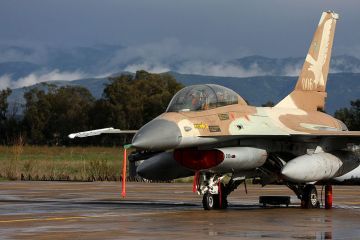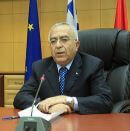 Everything you need to know about today’s media coverage of Israel and the Mideast.
Everything you need to know about today’s media coverage of Israel and the Mideast.
Mahmoud Abbas comes to bury Fayyad, not to praise him. And what does the US withdrawal from Iraq mean for Israeli and Iranian war strategies?
Visit Backspin every day and never miss a Media Cheat Sheet.
Iranian Atomic Urgency
• A US withdrawal from Iraq makes it easier for Israel to fly over Iraq to attack Iran. But there’s a catch: the same reasons make it easier for Iran to use Iraqi skies to reach Israel.
Although Iraqis will take over radar installations, it’ll be another year till they take possession of the necessary jets to guard their skies. The Washington Times explains:
“The country has a capable and improving capability to see the airspace, a viable system to provide command and control, but no system to defeat incoming air threats until it gets either the F-16s or ground-based systems or, optimally, some of both,” Gen. Buchanan told The Washington Times.
Iraq made the first payment in September for 18 F-16s that will not arrive until next fall at the earliest. This means Israel would have a theoretical window of about 12 months if it wants to fly over Iraq unimpeded by the Iraqi air force.
Retired Air ForceGen. Thomas McInerney, who advocates a U.S. strategic bombing raid to destroy Iran’s nuclear sites, agreed that Iraq’s open airspace would make it easier for an Israeli mission.
“Yes, it will be,” he said. “However, it will be much easier for Iranian forces to get to Israel through Iraq via land and air.”

• YNet News picks up on Iranian press reports that the mullahs are going to display four Israeli drones seized in Iranian airspace. If true, I would expect no less.
Peace Process
• A new section of the security barrier is being finished up, separating the Shuafat refugee camp from Jerusalem. AFP makes a serious charge here, but quotes no defense or municipality voices:
They will be left on the West Bank side of the barrier, while remaining technically inside the municipal boundaries of Jerusalem.
This means they will owe council tax, while being all but guaranteed to miss out on key services which should be provided by the city council.
But two NGOs (Ir Amim and The Popular Committee Against the Wall) did get a word in edgewise. How fair is that?

• Lend Jonathan Schanzer your ears: Mahmoud Abbas comes to bury Fayyad, not to praise him:
Abbas’s latest step has been to orchestrate a series of trials against the prime minister’s top officials . . .
In the Palestinian Authority, corruption probes aren’t launched unless the president wants them launched. In this case, Abbas has engineered these latest scandals to discredit Fayyad and cast doubt on the prime minister’s ability to deliver on his celebrated mandate of countering corruption. After all, the corruption goes to the highest levels of the Palestinian Authority, and the officials in question were appointed by Fayyad himself.
While the merits of these cases are yet to be determined, they are not designed to rid Palestine of corruption. Rather, by ousting ministers and hobbling Fayyad, Abbas creates an opportunity to replace them with figures more to his liking . . . .
The end of Fayyadism translates into another expensive taxpayer investment gone wrong in the Middle East. It means the end of an era that offered hope for political reform for the Palestinians. With little hope for change, it also marks the beginning of a new and dangerous period in the Palestinian-Israeli conflict.
Nonetheless, Tom Friedman thinks Israel should be more Fayyadistic than Fayyad.
Arab Spring
• Defecting Syrian soldiers told Human Rights Watch they were given direct orders to open fire on protesters and bystanders. CNN picks up on the harrowing HRW study:
At about the same time – in Daraa, where the protests began – a soldier alleged that his commander stood in front of the brigade and ordered: “Use heavy shooting. Nobody will ask you to explain.”
Another soldier deployed to Bukamal in May said his commander made it clear that the unit’s “job was not to arrest people, but to kill.”

• Take this to mean that quite Lebanese Sunnis are going to hit back at Hezbollah if/when Bashar Assad falls. Elias Muhanna writes in the NY Times:
The Future Movement activist told me he thought that taking the “sectarian road” was a surer way to pander to the emotions of the Sunni street these days than walking a more inclusive, nationalist path. “The first road is smooth, wide, and the gasoline is free,” he said. “The second has potholes in it, roadblocks; there’s no gas; and people are constantly puncturing your tires.”
See also David Schenker at the LA Times.
• Ed Husain’s words of wisdom in the Times of London:
Pressuring Islamists to accept liberal secularism or to recognise Israel risks derailing the Arab democratic experiment and making conflict flare up in the region.
• An LA Times staff-ed worries about the rights of Egypt’s Christians being safeguarded by the Muslim majority.
Rest O’ the Roundup
• For The Guardian, Arab banks for women-only are cool, but voluntary separate seating on Israeli busses is gender segregation.
• A group of international photographers is spending six months in Israel looking at other angles of the story. More at the NY Times and Israel21c.
Meanwhile, I see wire photographers spent some time in the Hula Valley Nature Reserve. We have cranes, more cranes, and the Hula painted frog which was thought to be extinct. No stereotypical street clash images today . . .
(Image of Fayyad via Flickr/GreeceMFA)

